====================
A sermon offered on the Last Sunday after the Epiphany, February 7, 2016, to the people of St. Paul’s Episcopal Church, Medina, Ohio, where Fr. Funston is rector.
(The lessons for the day are Exodus 34:29-35, Psalm 99, 2 Corinthians 3:12-4:2, and St. Luke 9:28-43a. These lessons may be found at The Lectionary Page.)
====================
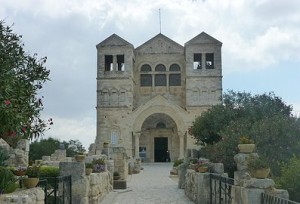 As many of you know, Evie and I were privileged to make a pilgrimage to the holy places of Palestine summer before last and one of the sites we visited was Mt. Tabor, the traditional “Holy Mountain” on which the Transfiguration is believed to have taken place.
As many of you know, Evie and I were privileged to make a pilgrimage to the holy places of Palestine summer before last and one of the sites we visited was Mt. Tabor, the traditional “Holy Mountain” on which the Transfiguration is believed to have taken place.
Mt. Tabor is quite tall and quite steep. It is what’s called an inselberg or isolated “island mountain” rising nearly 2,000 feet above the Kfar Tavor plain which it dominates. To get to the top, you have to get out of your large tour coach and board smaller (and quite dilapidated) eight-passenger mini-vans piloted by maniacal Bedouins who drive you at break-neck speeds up a road with several sharp switch-back turns to the Franciscan monastery and church at the summit. (Making that ascent “transfigured” Jesus in my mind’s eye from the rather scrawny figure we often see on crucifixes into a very fit, muscular mountaineer! He and his disciples must have been in really good shape to make that climb!)
The Church of the Transfiguration is one of several in the Holy Land built for the Franciscans by the early 20th Century architect Antonio Barluzzi, who accomplished there what Peter sought to do in the story we heard from Luke’s gospel. As one comes to the entrance of the church, before actually entering the main church, one finds to one’s left a separate chapel dedicated to Moses, and to one’s right, a chapel dedicated to Elijah. There is no direct communication between the chapels and the main church. As much as I admire the architecture of Barluzzi, and think some of his churches in Palestine are wonderful, I think he got this one wrong, because I have come to believe that communication is what the Transfiguration is all about. Before I get to that, however, I need to talk about time and eternity, for they form the backdrop of the communication in question.
I have, a few times in the past several months, shared with you the poetry of an English priest named Malcolm Guite, and want to do so again this morning. This is his sonnet entitled Transfiguration:
For that one moment, ‘in and out of time’,
On that one mountain where all moments meet,
The daily veil that covers the sublime
In darkling glass fell dazzled at his feet.
There were no angels full of eyes and wings
Just living glory full of truth and grace.
The Love that dances at the heart of things
Shone out upon us from a human face
And to that light the light in us leaped up,
We felt it quicken somewhere deep within,
A sudden blaze of long-extinguished hope
Trembled and tingled through the tender skin.
Nor can this this blackened sky, this darkened scar
Eclipse that glimpse of how things really are.
(Transfiguration: a glimpse of light before Lent)
I love Guite’s first two lines: “For that one moment, ‘in and out of time,’ on that one mountain where all moments meet . . . .”
In the ancient Greek language and in the Greek of the New Testament, there are two words both translated into English as “time.” The first is chronos; this is measurable time with, as one writer has put it, “the future passing through the present and so becoming the past.” This word is the root of such English words as chronic, chronicle, and chronology. Chronos is characterized by the itemized, studied measurement of time. The word is used 54 times in the New Testament. When Luke, for example, uses it, it is in the context of measurable time, as when he says a traveler went away for a “long time” (Lk 20:9). Interestingly, when Satan tempts Jesus with all the kingdoms of the world “in a moment of time,” it is this measurable form of time that Luke names (Lk 4:5).
Perhaps picking up on Luke’s implication, Fr. Patrick Reardon, an Orthodox pastor and theologian, has said of chronos:
Because it is made up of some things that don’t exist anymore [the past] and other things that don’t yet exist [the future], [chronos] is a true image of non-existence, a veritable icon of death. In fact, only dead time can be measured. Moreover, chronos is, in this respect, rather ghoulish. Even dead, it continues to feed on us. We may speak of “killing time,” but it invariably ends up killing us. Chronos is, therefore, an image of everlasting death, what the Bible calls the “bottomless pit,” or hell. What is hell but the reign of death in ongoing, unending sequence? (Orthodoxy Today)
The alternative to measurable time, chronos, is kairos, a word used 81 times in the New Testament, almost always to refer to “the proper time,” to signify a chosen moment as when, in Luke’s gospel, the angel of the annunciation tells Zechariah, father of John the Baptist, that events will be “fulfilled in their proper time.” (Lk 1:20) Kairos is “time as a moment, time as occasion, time as qualitative rather than quantitative, time as significant rather than dimensional.” (Reardon) Kairos is always a “now.” Says Fr. Reardon:
Kairos, because it is present, is an icon of eternal life. To experience the now, after all, one must be alive. The dead know nothing of now. Therefore, the now, the kairos, is an icon of the life of heaven. Indeed, eternal life is an everlasting now, in which there is no sequence, no before and after.
It is to kairos, to eternity, that Guite refers, I believe, when he describes the Transfiguration taking place in “one moment, ‘in and out of time,’ on that one mountain where all moments meet.”
In the Transfiguration, eternity irrupts into time. The Lutheran Greek scholar Rob Myallis reminds us that the Greek for “brilliant” “has tucked within it the word ‘astra’ [as in] ‘astronomy.’ Jesus is bright like the stars. Interestingly, the only other place this word appears in the whole Bible is [in the Greek Septuagint translations of] Ezekial and Daniel, perhaps a reminder that transfiguration has an eschatological bent – it is the future breaking in and not simply the past catching up!” (Lectionary Greek)
What Peter and James and John saw on that mountain top, what we are privileged to see with them through the evangelists’ reports, is a vision of the climax of history, of the end of chronos time, and in its place a vision of the eternal now of kairos. Eternity, longed for by prophets, seers, and visionaries, is realized in the Transfiguration of Jesus. Heaven and earth meet in the Transfiguration; past, present, and future meet without dissolving the distinction between them.
Baptist theologian Alan Culpepper in his commentary on Luke in The New Interpreter’s Bible says, “The transfiguration is like a composite of the whole Gospel tradition. In one scene we hear echoes of the baptism of Jesus, Jesus’ passion predictions, Jesus’ fulfillment of the Law and prophets, the death and resurrection of Jesus, and his ascension and future coming.” (Vol. IX, p 207) From his birth and baptism to his ascension and his expected return, Jesus’ Incarnation is summed up in the Transfiguration which allowed his disciples, and allows us, to see him clearly.
The pieces all fall into place in this remarkable moment of kairos when the past, present, and future meet. In that moment, eternity irrupts into time, kairos overwhelms chronos, and past, present, and future are crystal clear. Little wonder the disciples are bedazzled by star-bright brilliance!
And what happens in this moment of eternity is a conversation. Luke, adding to the stories of Matthew and Mark who also report the Transfiguration, is very careful to tell us that this event took place in the context of prayer. In the very first sentence of his tale he says, “Jesus took with him Peter and John and James, and went up on the mountain to pray.” Prayer, as we all know, is conversation with God. St. Ignatius Loyola, founder of the Society of Jesus, often used the Spanish word conversar to describe prayer. Conversar means “to converse,” “to talk with.” Its simplest meaning in English is sincere talk between persons, the kind of comfortable, satisfying conversation in which we truly get to know the other person. It is in this conversational context that the Transfiguration takes place.
It is exemplified by the appearance of Moses and Elijah with whom Jesus discusses his departure. It is often said that they represent the Law and the prophets and their fulfillment in Jesus. Jewish New Testament scholar Amy-Jill Levine, however, suggests otherwise. In her footnotes to Luke in The Jewish Annotated New Testament, she says this is unlikely, that instead they probably represent the elect, all the righteous people of God. (p. 120) They are human beings in intimate conversation with God Incarnate in Jesus the Christ.
How often do we imagine prayer to be nothing more than us talking to God? We who are formed in the Anglican tradition of “common prayer,” of saying together words from a book, often fall into this trap. I know a lot of Episcopal clergy who freeze up when asked to pray in public without a Prayer Book close at hand: “I don’t know how to pray extemporaneously; I don’t know the words to say,” they will explain in moments of candor. But if our prayer is truly to be the kind of comfortable, satisfying conversation in which we truly get to know the one with whom we are conversing, then our prayer should be at least as much listening as it is speaking. If God were to say nine words to us, what would they be? I suspect they would be the same ones said to Peter and James and John, “This is my Son, my Chosen; listen to him!”
We cannot all have experiences like the Transfiguration in our prayer lives, nor should we expect to do so. But the Transfiguration challenges us to seek something higher in prayer than speaking mere words in the hope that God might possibly somehow listen to us. Our daily prayer should include not so much talking and more listening, more communicating in hopes of hearing, of sensing, of knowing the powerful presence of God in our lives.
And that is where Peter got it wrong when he blurted out, not knowing what he was saying, “Let us make three dwellings, one for you, one for Moses, and one for Elijah.” That is where Antonio Barluzzi, brilliant architect that he was, got it wrong when he realized Peter’s ambition and built those chapels, separate and apart and not communicating with the nave of the Church of the Transfiguration. If the Transfiguration teaches anything, it is that dramatic experiences of Christ’s glory, glimpses of eternity, instances of kairos come in the dynamic reality of communication. Experiences of the glory of God are only possible if lived together, in community. Nobody, not even Jesus, could shine alone! The Transfiguration shows that it is only when we are together that God’s radiance can light ours and others lives. It is only in the intimacy of holy conversation with God and with one another that we find that “one moment, ‘in and out of time’,” that place “where all moments meet,” where we get “that glimpse of how things really are.”
Amen.
====================
A request to my readers: I’m trying to build the readership of this blog and I’d very much appreciate your help in doing so. If you find something here that is of value, please share it with others. If you are on Facebook, “like” the posts on your page so others can see them. If you are following me on Twitter, please “retweet” the notices of these meditations. If you have a blog of your own, please include mine in your links (a favor I will gladly reciprocate). Many thanks!
====================
Father Funston is the rector of St. Paul’s Episcopal Church, Medina, Ohio.
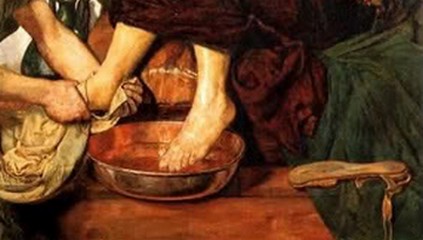 Every year on Maundy Thursday in the Episcopal Church we do this thing: we gather for Eucharist and we hear these lessons – the story of the Passover from the Book of Exodus, St. Paul’s retelling of the institution narrative of the Eucharist, and St. John’s story of the Last Supper in which he focuses not on the meal but on Jesus’ act of humility and service during the meal (probably quite early in the evening) of washing the feet of the others present.
Every year on Maundy Thursday in the Episcopal Church we do this thing: we gather for Eucharist and we hear these lessons – the story of the Passover from the Book of Exodus, St. Paul’s retelling of the institution narrative of the Eucharist, and St. John’s story of the Last Supper in which he focuses not on the meal but on Jesus’ act of humility and service during the meal (probably quite early in the evening) of washing the feet of the others present. Today is the Third Sunday in Lent but, being March 8, it is also the day set aside on the calendar (both that of the Church of England and that of the Episcopal Church) for us to remember a hero of the Anglican tradition, a World War I chaplain named Geoffrey Anketell Studdert-Kennedy. In 1914 he became the vicar of St. Paul’s, Worcester, UK, but a short while later, on the outbreak of war, Kennedy volunteered as a chaplain to the armed forces. He gained the nickname “Woodbine Willie,” for his practice of giving out Woodbine brand cigarettes to soldiers. In 1917, he won the United Kingdom’s Military Cross for bravery at Messines Ridge.
Today is the Third Sunday in Lent but, being March 8, it is also the day set aside on the calendar (both that of the Church of England and that of the Episcopal Church) for us to remember a hero of the Anglican tradition, a World War I chaplain named Geoffrey Anketell Studdert-Kennedy. In 1914 he became the vicar of St. Paul’s, Worcester, UK, but a short while later, on the outbreak of war, Kennedy volunteered as a chaplain to the armed forces. He gained the nickname “Woodbine Willie,” for his practice of giving out Woodbine brand cigarettes to soldiers. In 1917, he won the United Kingdom’s Military Cross for bravery at Messines Ridge. When Philip told Nathanael that he had found the Messiah and that he was the son of a carpenter from Nazareth, Nathanael’s immediate response was, “Can anything good come from Nazareth?” (Jn 1:46). Obviously Nazareth had a reputation, and not a good one. I often wonder if, as Jesus was making his way through the Holy Land, especially early in his ministry when he wasn’t well-known, people would ask him, “What was it like growing up in Nazareth?”
When Philip told Nathanael that he had found the Messiah and that he was the son of a carpenter from Nazareth, Nathanael’s immediate response was, “Can anything good come from Nazareth?” (Jn 1:46). Obviously Nazareth had a reputation, and not a good one. I often wonder if, as Jesus was making his way through the Holy Land, especially early in his ministry when he wasn’t well-known, people would ask him, “What was it like growing up in Nazareth?” Until our twenty-fifth wedding anniversary my wife had never traveled overseas. She’d been to Canada, but that was it for foreign travel for her. For our anniversary we went to Ireland, something we’d talked about doing for many years. In fact, it had been my plan for our honeymoon, but that (obviously) didn’t happen.
Until our twenty-fifth wedding anniversary my wife had never traveled overseas. She’d been to Canada, but that was it for foreign travel for her. For our anniversary we went to Ireland, something we’d talked about doing for many years. In fact, it had been my plan for our honeymoon, but that (obviously) didn’t happen. 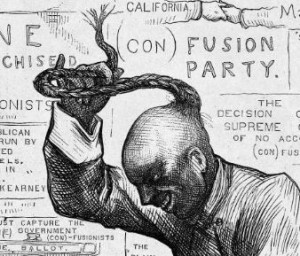 Believe it or not, I’ve actually had the last of these selected verses quoted to me as part of an argument against the use of incense in the church. I was in a conversation with someone about our use of incense in “high church” liturgies, being told (among other things) that incense was fine when we were younger and acting like hippies but now that we are older and mature we should put aside such childish ways, when this chestnut was pulled out. Since I’ve studied the Old Testament (as most clergy have) I knew my critic was misusing the text.
Believe it or not, I’ve actually had the last of these selected verses quoted to me as part of an argument against the use of incense in the church. I was in a conversation with someone about our use of incense in “high church” liturgies, being told (among other things) that incense was fine when we were younger and acting like hippies but now that we are older and mature we should put aside such childish ways, when this chestnut was pulled out. Since I’ve studied the Old Testament (as most clergy have) I knew my critic was misusing the text.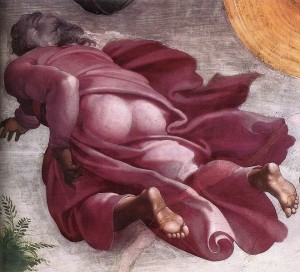 The translators of the NRSV are a bunch of prudes; a better translation of the last verse of this section would be “. . . you shall see my butt.”
The translators of the NRSV are a bunch of prudes; a better translation of the last verse of this section would be “. . . you shall see my butt.” “I threw it into the fire, and out came this calf!”
“I threw it into the fire, and out came this calf!” ADDED LATER: Oops!!! I just realized late on May 9 that I had read the lessons for May 10 one day ahead of time. This lesson is actually for the next day . . . . mea culpa, mea culpa, mea maxima culpa! Apologies, faithful readers!
ADDED LATER: Oops!!! I just realized late on May 9 that I had read the lessons for May 10 one day ahead of time. This lesson is actually for the next day . . . . mea culpa, mea culpa, mea maxima culpa! Apologies, faithful readers!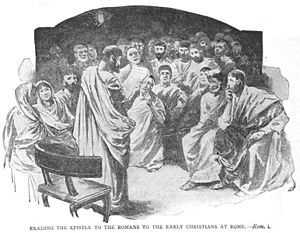 Apparently Moses didn’t learn anything from his experience at the battle with Amelek when he needed Aaron and Hur to hold up his hands, so his father-in-law Jethro has to remind him that he can’t do it all alone and that, if he tries to do so, he will wear himself out. Smart man, Jethro!
Apparently Moses didn’t learn anything from his experience at the battle with Amelek when he needed Aaron and Hur to hold up his hands, so his father-in-law Jethro has to remind him that he can’t do it all alone and that, if he tries to do so, he will wear himself out. Smart man, Jethro!

